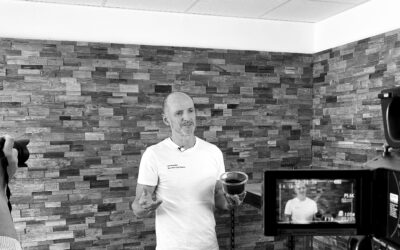Continuation of the previous blog post.
We keep talking. About money, politics and vision.
Aaron: You mentioned funding issues earlier. In the commercial sector, this can easily be explained. carbonauten prefers to seek strategic investors so that there is no conflict of interests when saving the world. This kind of thins out the potential partners.
However, once you have understood the carbonauten system (at least to some degree), you can’t help but be amazed. That’s really a damn good idea. Why isn’t the state putting any money into it?
Torsten: Because we simply don’t have a brave government in these matters. I think the conservative governments of the last decades were dormant when the topic of start-ups became big in Germany. It’s simply not a mentality of Germans to take risks. It came up with the successful startups from the U.S. that German entities realized, “Oh, that would be something for us as well.” But for a topic like ours, you need a lot of basic technical understanding.
The start-ups are at the trade fairs and then a politician comes in every now and then and thinks what you are doing is great. But the government just doesn’t have any budgets for it. That’s a problem in my opinion, because in Germany we make things very easy and leave everything to the economy. Neoliberalism claims that “the market will regulate it,” and I don’t believe that the market regulates.
Norway, for example, has its own state funds for this purpose, where the state invests in start-ups, so to speak. It is also good that it is the state that does it and not the private sector. Because the private sector always has its own interests. They then crush a start-up, that’s something that also happens. Ultimately, the startup is a competitor. The start-up really only exists because there are shortcomings somewhere in the economic system. Because things were not done. As a startup founder, you spot such a shortcoming, and that’s where you step in. Of course, this can become a threat.
The bottom line is that in Germany you are forced to offer parts from the company over many financing rounds. That’s when you water down. You lose more and more shares and get more and more shareholders in. This is increasingly difficult to handle. I know startups that started with 100% self-ownership and the founders are now at 30%. This means that on the other side there are powerful investors who have the opportunity to influence the company. You’re left out. It’s your idea, but someone else is using it.
It would actually make a lot more sense if you got big money once. Then you remain in charge, you can develop in peace, and you can bring in the experts you need. You’re not driven, as we are, by the fact that you need money for scaling. For expansion, for other sites.
That way you’re constantly pitching. You’re constantly introducing yourself to investors. You have to listen to all this talk about risk. They just keep explaining to you why it can’t be done. That’s nonsense. I don’t want to hear that. I already know it can be done.
Mr. Lindner was once at my booth at the Greentech Festival. Then he listened to what we are doing for 10 minutes. At the end, he asked: “Mr. Becker, what would you need from politics? Then I said I need a green government. I didn’t want to say I need money. The state is not allowed to do that in our system after all.
Aaron: How intensively has carbonauten had to defend itself against plagiarism so far?
Torsten: Christoph and I decided a few years ago that we have no competitors. I always liked Steve Jobs, the founder of Apple. He had a very clear stance. He said: “I don’t have any competition”. In our branch, you have to drop the concept of being enemies. When it comes to environmental protection, alternatives to fossil fuels, chemistry and energy, it’s an interdisciplinary project. Everybody gets something out of it. The more players are in, the better known and more attractive the topic of decarbonization becomes, the greater our chances. We must then stand out within this mass with special ideas, but the topic must be carried by all. “This is mine and I’m not going to let anyone else do it” is a mistake we believe. The more so since saving civilization is also a collective task. No startup can do that, and no multibillion-dollar company can do that. This is something that many humans have to do. We must be willing to redefine life.
I like Steve Jobs’ Blue Ocean strategy. That means blue ocean, I’m heading straight towards a destination. As a counter model, there’s the Red Ocean. That’s where you concern yourself with competitors. It’s like a shark tank where one kills the other and tries to outperform him. We are Blue Ocean. That’s totally relaxing, accelerates things and saves energy that you can invest in yourself.
And lastly, the carbonauten system is so complex and based on so much knowledge. Even if a huge corporation comes in and takes 100 million to crush us, we are smaller and much faster.
If someone is only money-driven, he will never be successful. Economically, perhaps in the short run, but for us the attitude is a very big momentum. I firmly believe that a customer, an employee, a politician, whoever is important to us, will always prefer us. Because it’s not just a product, there’s something else behind it.
Aaron: What will be the major milestones in 2023?
Torsten: Clearly the launch of the Eberswalde plant. We also intend to spin off the Agriculture and Polymers Business Units and convert them into separate GmbH & Co. KGs. carbonauten has 80% of the shares and 20% goes to the respective managers. Then these companies have a very strong concentration on certain sectors. Investors from the plastics sector would rather invest in a company that makes plastics than in a company that also makes agricultural products. You can explain to them 10 times that you also need a plastic sheet in agriculture, there are a lot of plastic products in agriculture, but they don’t think that far.
Then there may be a few more foundings of international subsidiaries. carbonauten Spain I think, the US, maybe the Balkans, maybe Indonesia. And then maybe this year we’ll go into pre-planning and funding for 2-3 more sites.
And then, of course, find more employees. The growth has to be substantiated, you can’t just build a factory. For the research and development sector and for the so-called services, be it human resources, marketing, sales, communications, finance and so on. These are all central functions, and you have to staff them with the right people. This doesn’t always mean the professor, but also great university students for example who can quickly adapt to a situation and who aren’t spoiled by a corporation yet. But the right people can also be experienced people who are simply up for it. For whom it’s no longer about money, but who say: “‘Man, I can live and work here. Here I have the freedom I need.” I don’t have to be an entrepreneur, I start working for carbonauten and then I am an entrepreneur within the company. I like that.
Aaron: What are the further plans for the Eberswalde site? Keywords: living laboratory, experiments with biomasses, carboneers, hardware development?
Torsten: Hardware, as you just said, correct. The technology is certainly being developed further there. We also have external impulses regarding activated carbon and hydrogen production.
In Eberswalde, we are also at the stage where we might be able to set up a small Carbon Valley. There are first interested parties. You can gradually expand the site.
What happens there can also be implemented at other locations. Nevertheless, other sites should also be able to make their own decisions in the future. And if innovations work well, they can be transferred to other locations. A certain dynamic can develop. A sportsmanlike, competitive atmosphere where employees simply feel: ” Man, we’re contributing something, we’re bringing something great into play.
So that’s the outlook: Here in Giengen, the central administration and organization. In Eberswalde mostly hardware, and of course for Eberswalde the desire for a research & development center as well, in a separate building, built in a very sustainable and ecological manner. Creating a home. This is upcoming now in ’23
Aaron: Okay this has raised more questions for readers than it has answered. What is a Carbon Valley?
Torsten: The idea for Carbon Valleys came up sometime around 2 years ago when I was thinking about Silicon Valley. Anestis had an internship nearby and praised the spirit there. He drove to San Francisco for a presentation and then attended some pitches and said: “Dad, they all walked out with 10 – 20 million. There were 10 startups and about 20 investors, and they all made a deal. That was awesome. This adventurous spirit, the willingness to take risks, that’s what Silicon Valley is all about: companies that all have something to do with computers, programming and hardware. Then I thought, why not Carbon Valley? Even if that now seems pretentious and crazy. The plants as a central element, where the energy and products are created. And around that, our employees and our own developments. Also with external companies, with start-ups, which perhaps need a pilot application, and which then fit in with us because they have something to do with ecology and environmental protection, with CO2 or other emissions. In the best case, this is then combined with a living situation. People live there on the site, in small employee villages, perhaps someday with a kindergarten, with a school. That’s bound to happen. I would definitely try it out on an experimental scale. Food is produced locally, for the people who live there. Then there’s aquacultures, where you have saltwater fish, or of course agriculture and greenhouses, which are supplied with our energy. And so on. There you can build a small carbonauten civilization.
Once you start, a lot of people will settle there. This has a magnetic effect. You have to reach a critical size, then more and more will come. All of this doesn’t have to belong to us. It’s about initiating lighthouse projects that give humanity a bit of hope. Because what mankind is facing is not going to be pleasant. I am absolutely convinced of that. Our way of life in a carbonauten valley could actually be an alternative.
I don’t think the answer to human development is to go back into the cave, even if that would be the best thing for us. We are but naked apes at the end of the day. But it’s hard to tell people, “You have to renounce everything now.” This is possible in an extreme situation like the war in Ukraine. There they have understanding for it, but to now take everything away from the people, they would rebel.
It’s interpersonal understanding that we need here. Compassion is one of the strongest human motives for me. Every human is partly a carbonaut.



